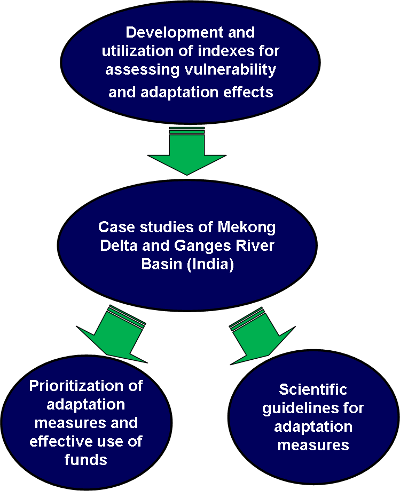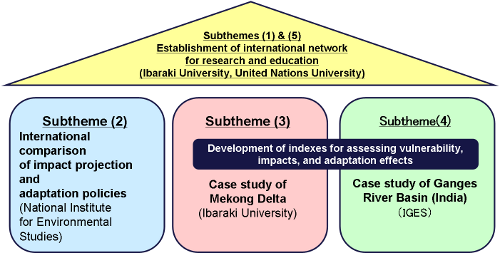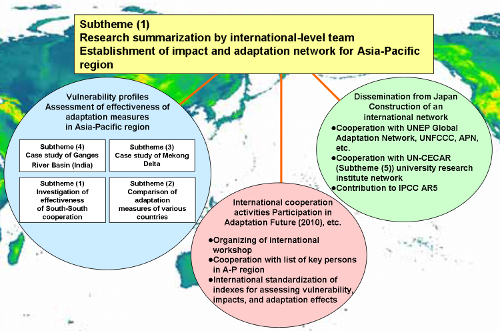Research Objectives
S-8-3 Research on indexes of vulnerability and adaptation effects in the Asia-Pacific region
The objectives of this research are a) elucidation of the present situation of international adaptation policies; b) development of indexes for assessing vulnerability, impacts, and adaptation effects with respect to climate change; c) necessary verification of these indexes though the implementation of case studies of the Mekong Delta and the Ganges River Basin; and d) accumulation of information and dissemination of research results through the establishment of an international network in the Asia-Pacific region, which is necessary for research, education, and policy investigations.

Flow of research

Interrelationships of subthemes
(1)Research on establishment of international network for development and implementation of assessments of vulnerability, impacts, and adaptation measures (Ibaraki University)
a)The research promotion system of the S-8-3 teams will be constructed and cooperation with existing international networks will be advanced.
For this purpose, in addition to participation in international symposiums and conferences on adaptation measures, the 1st international workshop
for establishing an independent network will be organized. Through these activities, a list of targeted countries and key persons for the adaptation
network in the Asia-Pacific region will be prepared, thus promoting the strengthening of the international network.
b)A compilation will be made of research on vulnerability and impact assessments, research on mitigation and adaptation measures, case studies,
and adaptation manuals in various countries, thereby promoting the creation of an overview of such research. Moreover, the international
network will be utilized to elucidate levels of interest in climate change and adaptation measures through questionnaires, centering around
key persons. Points of difficulty and gaps will be clarified at the same time.
c)The indexes for assessing vulnerability, impacts, and adaptation effects developed in Subtheme (3) will be disseminated aiming at international
standardization. Proposals will be made concerning South-South cooperation as an effective part of the process of overcoming the bottleneck in
implementation of adaptation measures. An international adaptation network will be established, and a research overview, vulnerability maps, and
adaptation effect maps will be prepared and disseminated to IPCC, etc.
(2) International comparison of impact projections and adaptation policies (National Institute for Environmental Studies)
a)The objectives of this research are to extract issues in the process of formulating and implementing adaptation plans to clarify support options at
the international level, and to investigate adaptation support measures that should be implemented in a forum under the United Nations Framework Convention
on Climate Change to clarify options with regard to improving the efficiency of adaptation-related funds distribution.
b)After systematizing the present conditions of impact projections as the first part of formulating an adaptation plan, and based on trends in
adaptation-related funding mechanisms, factors necessary for an international system for adaptation support will be extracted. Details of the
adaptation plans of various countries as well as details of mainstreamed adaptation measures and the process of formulating them in the development
plans of major developing countries will be thoroughly investigated to extract issues toward enhancement of support at the international level.
Options for improving the efficiency of adaptation-related funds distribution will be reviewed, and support options according to the international
system will be presented to facilitate mainstreaming of adaptation in the development plans of the developing countries.
(3) Development of indexes of vulnerability, impacts, and adaptation effects and case study of the Mekong Delta Ibaraki University
From past research, construction of an outline of indexes concerning vulnerability, impacts, and validity of adaptation measures will be initiated.
The gathering of data on sea-level changes, etc. targeting the Mekong Delta area will also be launched in order to construct a prototype database of
individual phenomena. At the same time, a simple assessment of the vulnerability of the Mekong Delta area to erosion will be tested.
Based on the results obtained, prototype indexes of vulnerability, impacts, and validity of adaptation measures will be created and a first proposal
will be made. Moreover, a method for future projection of land subsidence and sea-level changes in the Mekong Delta area will be developed and the
results of the projections will be presented. The vulnerability of the Mekong Delta area to flood disasters and erosion will be assessed,
vulnerability maps will be presented, and a comprehensive assessment will be made.
(4) Construction of policymaking framework for identifying adaptation effect indexes and win-win adaptation options (Institute for Global Environmental Strategies)
Through case studies of the Ganges River Basin, indexes for assessing adaptation effects will be identified in order to implement optimal adaptation measures in the agricultural sector (including agricultural water utilization). Construction of a more comprehensive policymaking framework so that policymakers can select win-win adaptation measures utilizing these indexes will also be investigated. Furthermore, findings obtained in this research will be shared and disseminated through the UNEP Asia-Pacific Adaptation Network, etc.
(5) University Network for Climate and Ecosystems Change and Adaptation Research (United Nations University)
The University Network for Climate and Ecosystems Change and Adaptation Research (UN-CECAR), which was established under an initiative of the Integrated Research System for Sustainability Science (IR3S) and United Nations University, forms a part of international academic cooperation in the climate change field.
In this research, the following activities will be implemented utilizing UN-CECAR:
a)A Web portal will be established to construct a platform for information such as on research programs and curriculums, etc. of various universities.
b)Workshops will be held to gain an understanding of the present conditions of adaptation research, programs, etc. and to summarize common denominators.
c)In cooperation with various universities and research institutions, existing resources, research, etc. will be fed back.
d)Research, projects, data, and information related to adaptation measures will be gathered to develop curriculums/modules.
e)Localized application of adaptation research, projects, etc. that have been accumulated up to the present time will be promoted. Based on this information, curriculums of adaptation measures in response to changes in local ecosystems will be prepared and their utilization will be promoted.
An outline of S-8-3 based on the above descriptions is shown below.

Outline of S-8-3
Research on establishment of international network for development and implementation of assessments of vulnerability, impacts, and adaptation measures |
||
(1) |
Name |
Affiliation |
| * Kazuya Yasuhara | Institute for Global Change Adaptation Science, Ibaraki University | |
| Hiromune Yokoki | Department of Urban and Civil Engineering, College of Engineering, Ibaraki University | |
| Satoko Miwa | College of Humanities, Ibaraki University | |
| Nobuo Mimura | Institute for Global Change Adaptation Science, Ibaraki University | |
| Frank Hiroshi Ling | Institute for Global Change Adaptation Science, Ibaraki University | |
| Yu Tabayashi | Institute for Global Change Adaptation Science, Ibaraki University | |
International comparison of impact projections and adaptation policies |
||
(2) |
Name |
Affiliation |
| Izumi Kubota | Social and Environmental Systems Division, National Institute for Environmental Studies | |
| Yasuko Kameyama | Center for Global Environmental Research, National Institute for Environmental Studies | |
| Kanako Morita | Center for Global Environmental Research, National Institute for Environmental Studies | |
Development of indexes of vulnerability, impacts, and adaptation effects and case study of the Mekong Delta |
||
(3) |
Name |
Affiliation |
| Hideo Komine | Department of Urban and Civil Engineering, College of Engineering, Ibaraki University | |
| Satoshi Murakami | Department of Urban and Civil Engineering, College of Engineering, Ibaraki University | |
| Hisamichi Nobuoka | Department of Urban and Civil Engineering, College of Engineering, Ibaraki University | |
| Tsuguki Kinoshita | Department of Regional and Environmental Science, College of Agriculture, Ibaraki University | |
| Makoto Tamura | Institute for Global Change Adaptation Science, Ibaraki University | |
| Yuji Kuwahara | Center for Water Environment Studies, Ibaraki University | |
Construction of policymaking framework for identifying adaptation effect indexes and win-win adaptation options |
||
(4) |
Name |
Affiliation |
| Prabhakar Sivapuram | Natural Resource Management Group, Institute for Global Environmental Strategies (IGES) | |
| Isao Endo | Natural Resource Management Group, Institute for Global Environmental Strategies (IGES) | |
| Daisuke Sano | Natural Resource Management Group, Institute for Global Environmental Strategies (IGES) | |
| Ikuko Matsumoto | Natural Resource Management Group, Institute for Global Environmental Strategies (IGES) | |
University Network for Climate and Ecosystems Change and Adaptation Research |
||
(5) |
Name |
Affiliation |
| Srikantha Herath | United Nations University Institute for Sustainability and Peace | |
| Osamu Saito | United Nations University Institute for Sustainability and Peace | |
| Hideyuki Konishi | United Nations University Institute for Sustainability and Peace | |
- 【Theme 1】
Research on highly reliable quantitative assessment of climate change impacts throughout Japan - S-8-1(1) Research on climate change impact assessment using an integrated assessment model and adaptation policies
- S-8-1(2) Development of a climate change downscaler and its practical implementation
- S-8-1(3) Research on assessment of climate change impacts on water resources and adaptation measures
- S-8-1(4) Estimation of coastal disaster risks and development of nationwide risk maps
- S-8-1(5) Quantitative assessment of impacts of climate change on natural vegetation in East Asia including Japan
- S-8-1(6) Regional assessment of climate change impacts and adaptation measures in agriculture and food production
- S-8-1(7) Impacts of climate change on human health – Refinement of assessment methods and creation of measures -
- S-8-1(8) Research on assessment of climate change impacts on vector-borne infectious diseases and adaptation policies
- S-8-1(9) Research on the structure of benefits and burdens of climate change adaptation policies by region and sector
- 【Theme2】
Research on impact assessment and comprehensive adaptation policies at the local government level - S-8-2(1) Research on comprehensive assessment of climate change impacts and adaptation policies in local communities
- S-8-2(2) Research on adaptation measures for water-related and landslide disasters in Kyushu as a region of advancing subtropical climate
- 【Theme3】
Research on indexes of vulnerability and adaptation effects in the Asia-Pacific region - S-8-3 Research on indexes of vulnerability and adaptation effects in the Asia-Pacific region


